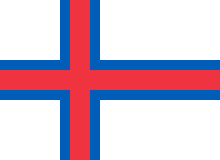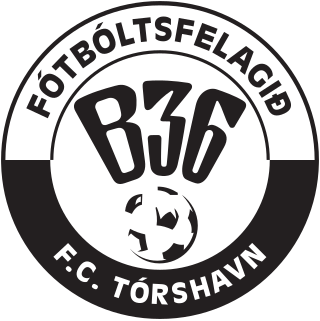
B36 Tórshavn is a Faroese football club based in the capital of Tórshavn, playing in the Faroe Islands Premier League, the top tier of Faroese football. B36 Tórshavn has always played its home games in Gundadalur.
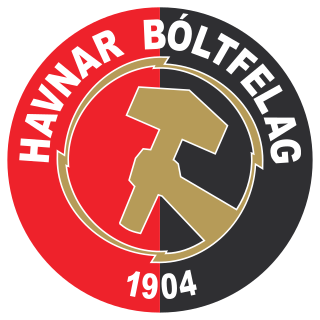
Havnar Bóltfelag is a Faroese professional football club, and is one of the oldest in the Faroe Islands. The club was founded in 1904, and is based in the city of Tórshavn. Home matches are played in Gundadalur and they compete in the Faroe Islands Premier League. The full name of the club is "Havnar Bóltfelag Tórshavn", which means "Port Football Club". The club was founded by port workers.
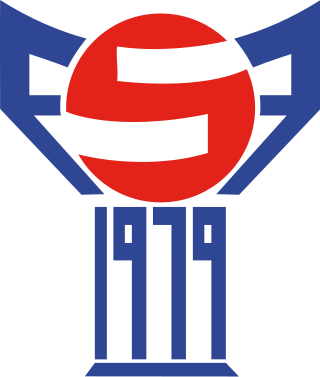
The Faroe Islands national football team represents the Faroe Islands in men's international football, and is governed by the Faroe Islands Football Association (FSF). The FSF became a member of FIFA in 1988 and UEFA in 1990 and represents the fourth-smallest UEFA country by population.

Klaksvík is the second largest town of the Faroe Islands behind Tórshavn. The town is located on Borðoy, which is one of the northernmost islands. It is the administrative centre of Klaksvík municipality.

Suðuroy is the southernmost of the Faroe Islands. The island covers 163.7 square kilometres (63.2 sq mi). In 2018 the population was 4,601. Suðuroy region (sýsla) comprises this island and Lítla Dímun, the next isle northward in the Faroes, which is uninhabited.

The culture of the Faroe Islands has its roots in the Nordic culture. The Faroe Islands were long isolated from the main cultural phases and movements that swept across parts of Europe. This means that they have maintained a great part of their traditional culture. The language spoken is Faroese. It is one of three insular North Germanic languages descended from the Old Norse language spoken in Scandinavia in the Viking Age, the others being Icelandic and the extinct Norn, which is thought to have been mutually intelligible with Faroese.
The Island Games are biennial international multi-sports events organised by the International Island Games Association (IIGA). Competitor teams each represent different island communities which are IIGA members. Currently, all competitor teams represent non-sovereign territories of European nations—some within European waters and some further overseas.
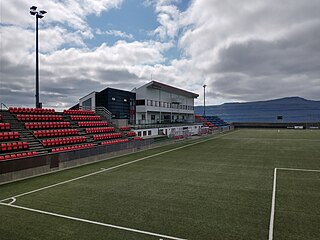
Svangaskarð, also referred to as Tofta Leikvøllur, is a multi-purpose stadium in Toftir, Faroe Islands with two football fields and a sports arena for athletics around the lower field. It is currently used mostly for football matches. The stadium holds 6,000 people. It was the sole home ground of the Faroe Islands national football team from 1991 and until the Tórsvøllur Stadium was built in the capital Tórshavn in 1999 and is still occasionally used for international football matches.

The Danish Realm, officially the Kingdom of Denmark, or simply Denmark, is a sovereign state consisting of a collection of constituent territories united by the Constitutional Act, which applies to the entire territory. It consists of metropolitan Denmark—the kingdom's territory in continental Europe and sometimes called "Denmark proper" —and the realm's two autonomous regions: the Faroe Islands in the North Atlantic and Greenland in North America. The relationship between the three parts of the Kingdom is known as Rigsfællesskabet.
Football is the most popular sport in the Faroe Islands, which is an autonomous territory within the Kingdom of Denmark. 60% of those who play sport on the islands play football. Football in the Faroe Islands is governed by the Faroe Islands Football Association, and it is a member of UEFA and FIFA, despite not being a sovereign state.

The Faroe Islands women's national football team represents the Faroe Islands in women's association football and is controlled by the Faroe Islands Football Association (FSF), the governing body of all football in the Faroe Islands. The FSF became a member of the International Federation of Association Football (FIFA) in 1988 and Union of European Football Associations (UEFA) in 1990. By population, it remains the fourth smallest member of UEFA, which encompasses the countries of Europe. The women's team played their first FIFA-sanctioned international match in 1995 and have never advanced to the finals of the FIFA Women's World Cup or UEFA Women's Championship. They took part in the Island Games in 2001, 2003 and 2005 and won all three tournaments, as well as appearing at the 2010 edition of the Algarve Cup. In the Faroe Islands, the team is known as the Kvinnulandsliðið.
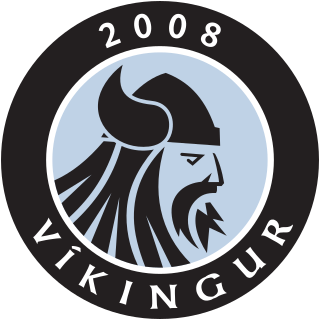
Víkingur is a Faroese professional football club based in Leirvík. The club was founded in 2008 after the merger of GÍ Gøta and Leirvík ÍF. They play at the Serpugerði Stadium in Norðragøta. Both villages are part of the same municipality Eysturkommuna, located on the island of Eysturoy and about 5 kilometers away from each other. The club won the Faroese championship for the first time in the 2016 season. In the 2017 season, Vikingur won the championship again.

The Faroe or Faeroe Islands, or simply the Faroes, are an archipelago in the North Atlantic Ocean and an autonomous territory of the Kingdom of Denmark. The official language of the country is Faroese, which is closely related to and partially mutually intelligible with Icelandic.

The Faroe Islands national under-21 football team are a feeder team to the Faroe Islands national football team. The Faroe Islands U21 team was first formed in 2006 and took part in UEFA European Under-21 Championship qualifying for the first time in 2007 and 2008. Before this there was no step between the U-19 team and the senior team.
The Croatia national under-17 football team represents Croatia in international football matches for players aged 17 or under. It is governed by the Croatian Football Federation, the governing body for football in Croatia. It is a member of UEFA in Europe and FIFA in global competitions. The team's colours reference two national symbols: the Croatian checkerboard and the country's tricolour. They are colloquially referred to as the Mali vatreni. So far, the Mali vatreni qualified for nine UEFA European Under-17 Championships. Croatia's greatest success in the tournament was third place in 2001. The team also finished fourth in 2005. Croatia also participated in three FIFA U-17 World Cups since its independence, in 2001, 2013 and 2015, being eliminated in quarter-finals in 2015, its biggest success so far in this tournament.
The Faroe Islands Premier League kvinnur is the top level women's football league of the Faroe Islands. It was called 1. deild kvinnur until 2018, when the Faroese top tier in the women's football for the first time was named after a sponsor. The new name was Betri Deildin kvinnur and is a deal for five years, from 2018 until the end of the 2022 season.
The Faroe Islands U-17 National Team represents the Faroe Islands at under-17 age level and is controlled by the Faroe Islands Football Association.

The Faroe Islands national football team represents the Faroe Islands in association football and is controlled by the Faroe Islands Football Association (FSF), the governing body of the sport in the country. It competes as a member of the Union of European Football Associations (UEFA), which encompasses the countries of Europe. Organised football has been played in the country since the 19th century; Tvøroyrar Bóltfelag was its first club, founded in 1892. Initially, clubs played friendlies to determine the winner of an unofficial championship, with matches being contested home and away, depending on the weather and the state of the generally uneven grass pitches. The Faroe Islands Sports Association was formed in 1939, and three years later a national league was created. Cup competitions were introduced in 1955 before the FSF was founded on 13 January 1979.

The 17th FINA World Championships were held in Budapest, Hungary from 14 to 30 July 2017.

Faroe Islands competed at the 2022 World Aquatics Championships in Budapest, Hungary from 17 June to 3 July.
